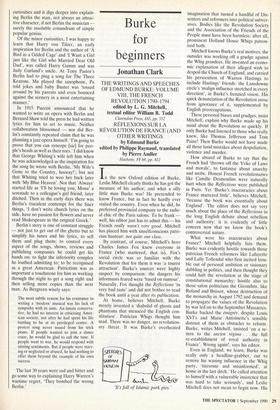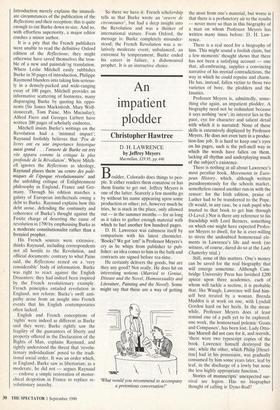Burke for beginners
Jonathan Clark
THE WRITINGS AND SPEECHES OF EDMUND BURKE: VOLUME VIII, THE FRENCH REVOLUTION 1790-1794 edited by L. G. Mitchell, textual editor William B. Todd
Clarendon Press, f65, pp. 552
REFLEXIONS SUR LA REVOLUTION DE FRANCE (AND OTHER WRITINGS by Edmund Burke edited by Philippe Raynaud, translated by Pierre Andler In the new Oxford edition of Burke, Leslie Mitchell clearly thinks he has got the measure of his author; and what a silly little man Burke was! He pretended to know France, but in fact he hardly ever visited the country. Even when he did, he preferred provincial company to the radic- al chic of the Paris salons. To be frank well, his editor just has to admit this — his French really wasn't very good. Mitchell has placed him with unselfconscious patri- cian hauteur: not quite our class.
By contrast, of course, Mitchell's hero Charles James Fox knew everyone in France (who mattered, that is). Fox's social circle was so familiar with the Revolution that for them it was 'a tourist attraction'. Burke's sources were highly suspect by comparison: the dangers his informants feared were 'based on rumour'. Naturally, Fox thought the Reflections 'in very bad taste' and did not bother to read the book until a year after its publication.
At home, believes Mitchell, Burke merely invented a 'diabolid of ghosts and phantoms that menaced the English con- stitution'. Patrician Whigs thought him mad. There was no danger, no revolution- ary threat. It was Burke's overheated
of Islamic pork pies.'
imagination that turned a handful of Dis- senters and reformers into political subver- sives. Bodies like the Revolution Society and the Association of the Friends of the People must have been harmless: after all, prominent Holland House Whigs patron- ised both.
Mitchell knows Burke's real motives: the outsider was working off a grudge against the Whig grandees. He invented an econo- mic explanation of their alleged wish to despoil the Church of England, and carried his persecution of Warren Hastings to include Hastings' friends: the Lansdowne circle's 'malign influence stretched in every direction', in Burke's frenzied vision. His quick denunciation of the Revolution arose from ignorance of it, supplemented by English preoccupations.
These personal biases and grudges, insist Mitchell, explain why Burke made up his mind about the Revolution so quickly. If only Burke had listened to those who really knew, like Thomas Jefferson and Tom Paine! Then Burke would not have made all those lurid mistakes about despoliation, violence and murder.
How absurd of Burke to say that the French had 'thrown off the Yoke of Laws and morals', to fantasise about anarchy and mobs. Honest French revolutionaries like Camille Desmoulins were naturally hurt when the Reflections were published in Paris. Yet 'Burke's inaccuracies about France mattered little', believes Mitchell, 'because the book was essentially about England'. The editor does not say very much about the place of the Reflections in the long English debate about rebellion and authority: it is evidently of little concern now that we know the book's controversial nature.
What were his inaccuracies about France? Mitchell helpfully lists them. Burke was evidently hostile towards those patrician French reformers like Lafayette and Lally Tollendal who first incited trou- ble out of personal ambition or visionary dabbling in politics, and then thought they could halt the revolution at the stage of constitutional monarchy; hostile also to those salon politicians the Girondins, like Roland and Brissot, whose destruction of the monarchy in August 1792 and demand to propagate the values of the Revolution by war led on to the September Massacres. Burke backed the emigres, despite Louis XVI's and Marie Antoinette's sensible distrust of them as obstacles to reform. Burke, writes Mitchell, insisted 'on a re- turn to the ancien regime . . . the full re-establishment of royal authority in France'. Wrong again!, says his editor.
Even in England, we learn, Burke was really. only a headline-grabber, out to restore his waning influence in the Whig
party, 'tiresome and misinformed', at home in the last ditch. 'He called attention to himself with a vulnerable insistence that was hard to take seriously', and Leslie Mitchell does not mean to begin now. His
Introduction merely explains the immedi- ate circumstances of the publication of the Reflections and their reception: this is quite enough to cut Burke down to size. And so, with effortless superiority, a major editor crushes a minor author.
It is a pity that the French publishers were unable to read the definitive Oxford
edition of the Reflections; they might otherwise have saved themselves the trou- ble of a new and painstak;ng translation.
Where Leslie Mitchell easily rubbishes Burke in 50 pages of introduction, Philippe Raymond blunders into taking him serious- ly in a densely-packed and wide-ranging essay of 100 pages. Mitchell provides an informative scattering of footnotes, many disparaging Burke by quoting his oppo- nents (Sir James Mackintosh, Mary Woll- stonecraft, Tom Paine, Mrs Macaulay); Alfred Fiero and Georges Liebert have written 200 pages of scholarly endnotes.
Mitchell insists Burke's writings on the Revolution had a 'minimal impact';
Raynaud foolishly believes that 'Peu de livres ont eu une importance historique aussi grand . . . l'oeuvre de Burke est tres vite apparu comme la critique la plus profonde de la Revolution'. Where Mitch- ell ignores the Reflections as ideology, Raynaud places them 'au centre des pole- miques de l'epoque revolutionnaire' and the unfolding critique of Enlightenment
philosophy in England, France and Ger- many. Through his edition marches a galaxy of European intellectuals owing a debt to Burke. Raynaud explains how this debt arose, defending the continuity and coherence of Burke's thought against the Foxite charge of deserting the cause of revolution in 1790 by emphasising Burke as a moderate constitutionalist rather than a frenzied prophet.
His French sources were extensive, thinks Raynaud, including correspondents not all hostile to the Revolution, and
official documents: contrary to what Paine said, the Reflections rested on a 'very
considerable' body of information. Burke was right to react against the English Dissenters: they had indeed been inspired by the French revolutionary example.
French principles entailed revolution in England, not reform: Burke's swift anti- pathy arose from an insight into French events that his English contemporaries often lacked.
English and French conceptions of 'rights' were indeed as different as Burke said they were; Burke rightly saw the fragility of the guarantees of liberty and property offered in the Declaration of the Rights of Man, explains Raynaud, and rightly understood the threat that 'revolu- tionary individualism' posed to the tradi- tional social order. It was an order which, in England, Burke saw as libertarian; as a moderate, he did not — argues Raynaud — endorse a simple restoration of monar- chical despotism in France to replace re- volutionary anarchy.
So there we have it. French scholarship tells us that Burke wrote an 'oeuvre de circonstance', but had a deep insight into the Revolution and was a thinker of international stature. From Oxford, the message is: Burke completely misunder- stood; the French Revolution was a re- latively moderate event; unbalanced, an extremist by temperament, Burke ended his career in failure, a dishonoured prophet. It is an instructive choice.



















































 Previous page
Previous page